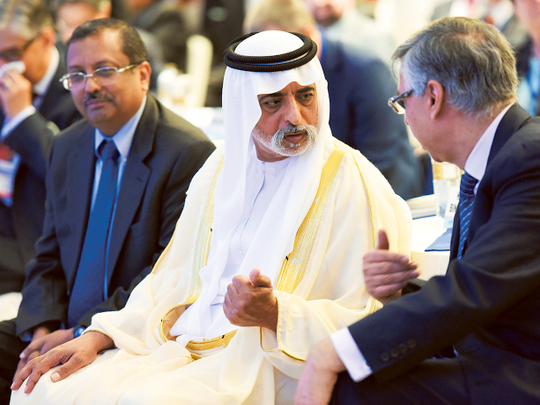
Dubai: The collapse in the oil price has increased the need for the United Arab Emirates to build a knowledge-based economy, Shaikh Nahyan Bin Mubarak Al Nahyan, UAE Minister of Culture and Knowledge Development, told Gulf News on Tuesday.
The UAE is transitioning to an economy based on production, distribution and use of knowledge and information as part of its Vision 2021 National Agenda. The strategy was set before the oil crunch that has put pressure to tighten budgets and rein in spending.
“This is very important and that of course requires development of human resources and also the education and the training required for the 21st century,” Shaikh Nahyan told Gulf News at an Indian business conference in Dubai.
Through a knowledge-based economy, in addition to promoting other non-oil sectors, the UAE is seeking to cut its reliance on oil to 20 per cent over the next 10 to 15 years, according to comments by the UAE Minister of Economy Sultan Bin Saeed Al Mansouri last October. The oil sector accounts for 30 per cent of the country’s gross domestic product today.
“If we want to develop [a knowledge economy] we have to improve our acquisition of knowledge and our ability to disseminate and to make it useful for our economy,” Shaikh Nahyan said.
“We are of course […] putting in place all the required ... regulation needed to enhance the use and development of the technology.”
Under the 2021 strategy, the UAE says it is “promoting innovation and research and development, strengthening the regulatory framework for key sectors, and encouraging high value-adding sectors.”
The UAE, with relatively liberal business regulations compared to other countries in the region, has been able to attract entrepreneurs from across the Middle East and elsewhere.
However, as of 2014, the construction, business and industrial sectors accounted for about 70 per cent of the 4.4 million employees in the private sector registered with the Ministry of Labour.
The UAE, despite being arguably the most diversified economy in the region, is facing pressure with oil below $40 (Dh146) a barrel and has trimmed its budget this year by 1.1 per cent. The UAE Economy Minister has said it will be “a challenge” for its economy to grow by more than 3 per cent this year. The International Monetary Fund is forecasting the country’s economy to grow by 2.6 per cent this year and post a 7.5 per cent fiscal deficit.
In an speech at the conference, Shaikh Nahyan said global economic concerns mean the relationship between the UAE and India is “more important than ever.”
In February, His Highness Shaikh Mohammad Bin Zayed Al Nahyan, Crown Prince of Abu Dhabi and Deputy Supreme Commander of the UAE Armed Forces made an official state visit to India meeting with Prime Minister Narendra Modi.
India’s Ambassador to the UAE T.P. Seetharam said at the conference “the embrace” between the two countries has opened up new opportunities in food, defence and space industries.
“We are not talking anymore of a transaction relationship of just trade and arrival of labour and remittances,” he said.
The UAE and India are each others third largest non-oil trading partners with UAE non-oil exports to India worth $5.3 billion in 2014, according to state news agency WAM.












